Opera stars Sir Thomas Allen and Christopher Gillett talk about their experiences in the opera world
They regularly meet on the world’s major stages. Now the two singers are working together at Opera Zuid, where Christopher Gillett is directing a new version of Der Schauspieldirektor and the baritone of the twentieth century, Sir Thomas Allen, is performing as the Schauspieldirektor.
Why did you want to create a new version of Der Schauspieldirektor?
Christopher: “I have been working in opera all my adult life and have written a number of books about what it is like in this world. It feels like a luxury now to be allowed to create a show about the process and difficulties of creating an opera. I would like to show that behind the scenes it is all not so glamorous; we are not superhumans, we also just curse when something goes wrong and we are sometimes quite lonely in this travelling existence.”
Thomas: “Indeed, people like to make opera singers into some kind of icons, but of course we are not that at all. Although by now I wouldn’t know who I am without this life and without all those roles. I wouldn’t have wanted it any other way, even though every day you feel the responsibility and pressure to sing well and therefore your voice must always be in good condition.”
Christopher:“I like the fact that in this production I don’t have to depend on my voice. Moreover, I like the fact that I can now decide all by myself how I want the performance to be, unlike when, as a singer, I have to stick to the director’s idea.”
Thomas: “Oh yes, I enjoy the fact that as an actor I now get to decide how I use my voice [intonation and volume] to pronounce the text and tell the story, instead of the music dictating it.”
Christopher:“In opera, the music defines what we do. That’s very different from a play. That’s why I find it so exciting to combine both of those in one performance now; both opera arias and spoken stage texts.”
Did you – when creating this show – also have to deal with the difficulties that arise in Der Schauspieldirektor?
Christopher: “Yes, the performance is based on real-life perils like that. For instance, a singer sometimes drops out. Then the directing assistant has to read out the text and meanwhile show the substitute singer where to walk, so that he or she only has to sing the aria.
“However, I didn’t want too many set changes and technical gadgets, so that saves a lot of trouble. I like to let the theatre speak, for there is enormous dramatic power in the music and singing itself. I think it’s a shame when technology (for example, running film footage in the background) takes the focus away from what is essential in opera.”
Thomas recalls: “Back in the days, the most important thing was that the singer stood in the right place, sang his aria and everyone else stood still. More than once I experienced a soloist turning around and admonishing: ‘I don’t want to see anyone move while I’m singing my aria!’ Sometimes that was a bit excessive, but of course opera is all about the vocal art and it should not be overshadowed, but complemented.”
In Der Schauspieldirektor, it showes that having a career in theatre has consequences for one’s private life. How was and is that for you?
Christopher: “You are often away from home, which is not easy when you have a family. My first marriage broke down because we were together so little. Since then, I manage to balance personal and professional better. I now often travel with my wife, who is also a singer, and vice versa.”
Thomas: “Unfortunately, you don’t learn that in school. They should actually teach [counts on his fingers: one] taxes and [two] how to handle life when you have this profession. I am very grateful to my wife who has now travelled with me for thirty-five years. She did have to get used to that; [laughter] she had to become a kind of reverse Margaret Thatcher, a Duke of Edinburgh, standing behind this Queen. It helped me enormously that she gave me that space.”
Thomas thinks for a moment and then continues: “But it is a world in itself, this opera. You regularly meet people in different productions and work intensively with them for a while; it automatically becomes a kind of opera family. If you ever feel gloomy – alone, far from home – that family helps you recover.
Interview: Kyra Bertram
